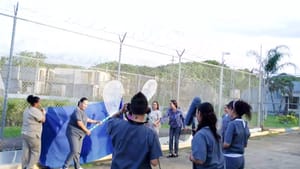Stay in the Loop
BSR publishes on a weekly schedule, with an email newsletter every Wednesday and Thursday morning. There’s no paywall, and subscribing is always free.
When did you feel time was running out?
PHLAFF presents Llaima Sanfiorenzo’s ‘ALAS’

ALAS (WINGS), screening online at this year’s Philadelphia Latino Film Festival (PHLAFF), is a participatory film made with 42 women from the Vega Alta and the Bayamón correctional facilities in Puerto Rico. The documentary is a form of self-exploration that reveals the immeasurable losses of being incarcerated.
Through media including writing, drawing, and video, director Llaima Sanfiorenzo unveils the women’s hopes and fears about their future. Many of the scenes are fragmented, poetic, or confessional, showing us the women’s humanity and strength as they endure hardship.
Still standing
The opening shot takes us underwater. The soft voice of a female narrator emerges. She stares at the clock, ticking away. “I watch the time pass as I grow older. Today, I am a woman with gray hair and wrinkles.” “I’m 76, but I’m still standing. My name is Esperanza and this is my life.”
This is the story of mothers, wives, professionals, and immigrants sharing a prison. Some have glasses, short haircuts, messy hair, tattoos on their hands; some speak with a smile and laugh as they show drawings of super beings. Others are sullen, unable to fight the tears. They speak about their pasts, how much pain they carry despite the years.
In one scene, a group of women film an angel helping an inmate escape. Two stand in front of a blue sheet used for video effects; someone lifts the mic; another fixes the camera; another is fanning the actors to give them the appearance of flying. The episode was inspired by a dream. It’s a behind-the-scenes look, allowing us to notice the collective spirit in tying a scene together. Through this process, the women explore another emotional reality and discover themselves through a different lens.
Where injustice weighs more
An inmate recounts the lows and highs of her life, as represented by a drawing of peaks. Her mom passed away the year she received her high-school diploma. Still, she completed her nursing degree, but then lost her position due to a court case, eventually leading to prison. Another woman shows a wheel filled with items, representing the outside world: community, nature, hope, friends, and family. She lost all of it to drugs, gambling violence, and alcohol. Another inmate notices the word dolor (pain) written under her wheel in large letters. She tells her, “I’d like to help, so she can heal those wounds.”
Many of the women interviewed want to make amends for their mistakes, find redemption, make up for lost time; but, as one woman says, “sometimes injustice weighs more than justice.” We meet another inmate, who had been abused by her husband throughout their marriage and courtship. In one of his attacks, she fought back and was charged with assault. She conveys her traumatic past by hiding from her husband behind some colorful curtains.
Violence against women
Machismo culture is prevalent on the island, and those patriarchal attitudes also influence institutions that are meant to protect women from abusers. In May 2020, the number of calls for CRIAS, a hotline for victims of domestic violence in Puerto Rico, rose to 1,000. In the past few years, Puerto Rico has seen an increase of gender-based violence cases. At least 60 women were killed last year, a 62 percent increase in femicides compared to the previous year, according to the civil rights coalition Observatorio de Equidad de Género. This trend is worrying, especially for those living in vulnerable populations that lack police accountability.
These women who experienced violence in their homes continue to experience it under the criminal justice system. Institutions should not simply resort to punishment, but rather focus on self-growth and alternative therapy. One negative action is connected to a myriad of factors.
Alternative programs for incarcerated folks allow not just a connection to the outside world, but teach valuable social and professional skills. With this project, the women from Vega Alta and Bayamón were able to learn camera work, sound, and storytelling. Art allows us to understand our emotions, which may provide support when we most need it.
Another human being
Toward the end of the documentary, an inmate poses a poignant question. “When did you feel time was running out?” A woman recalls the many times during her long prison sentence that she wanted to end her life. But she continued to stay alive, because each day made her see things differently. She talked about the mistake she made. “I’m just another human being who didn’t have the right to do what I did.”
This project was made in collaboration with the Correctional Theater Project, directed by Elia Enid Cadilla, who accompanied director Sanfiorenzo and served as teacher. ALAS is available to stream June 4 through 6 as part of PHLAFF.
Image description: Nine women, many of them wearing dark blue prison uniforms, stand in a circle, working on a film project beside a high chain-link fence with coils of barbed wire at the top.
What, When, Where
ALAS (WINGS). Directed by Llaima Sanfiorenzo. Available to stream at the Philadelphia Latino Film Festival June 4-6, 2021. PHLAFF 2021 runs from May 30 to June 6. phlaff.org
Sign up for our newsletter
All of the week's new articles, all in one place. Sign up for the free weekly BSR newsletters, and don't miss a conversation.

 Cynthia Via
Cynthia Via